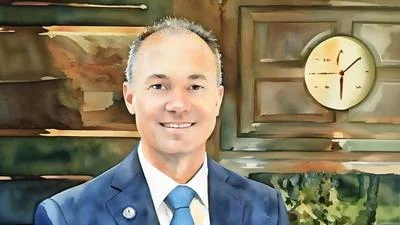This transcript has been edited for length and clarity.
Joel Kotkin was a reporter at the Washington Post and is a Presidential Fellow at Chapman University. He is the author of “The New Class Conflict,” “The Next Hundred Million: America in 2050,” and “The Coming of Neo-Feudalism: A Warning to the Global Middle Class.”
Federal Newswire
What were your early books about?
Joel Kotkin
My first book was about California, called “California Ink”, this was published in about 1980. [It predicted that] the next 20-30 years would be dominated by California. I think I was completely and totally correct…There's just no question.
The big thing is that California attracted people from all over the world and was a great place of opportunity. As we can talk about later, it's less so.
I wrote a history of cities in which I predicted, in part, that suburbanization was going to be the permanent feature. That did not make me popular with certain people. Because we still have a world of urban planners and theorists who think if we all lived in a two foot by one foot apartment and didn't have a backyard that life would be better. That's not what people want.
My work has been really to look at this transition and the conflict with idealization of a certain kind of lifestyle.
Federal Newswire
Is it encouraging that we live in a culture where we can still have these public debates?
Joel Kotkin
I think so, but what worries me…the media has really bifurcated in a really scary way. There is a dominant mainstream media. Then, you have a kind of right-wing eco-structure, which is frankly more open than the left-wing. Now, of course ever since 2020, these divisions have become greater.
Sometimes I'll read something particularly in the mainstream media and say, “what planet are you living on?” There was one story that said, “all these people are leaving Florida because it has horrible human rights, or they don't like DeSantis.” I said, “I don't know, I just looked at the census and it seems to me that Florida had the biggest population gain in the country yet people [are] always coming and going.”
I'm a long-time Democrat. I worked for the Progressive Policy Institute with Will Marshall. I consider myself kind of a traditional social Democrat. I have no place to go.
Federal Newswire
What will the impact be if people are forced to buy electric vehicles?
Joel Kotkin
California passed a lot of these laws. What happened was people moved and businesses moved. I almost moved to Houston about 10 years ago. If we had moved to Houston, our carbon emissions would have doubled just because of the climate, because you have to run the air conditioning.
Every person and, let's say, every industry that moves to Arizona or moves to China is going to have more emissions than they would in California.
You [also] have a massive impact on California Hispanics, for instance. [Also] African Americans are doing far worse than they are in other places. Once you adjust for the cost of living, basically, California African Americans are doing about as well and maybe a little worse than in Mississippi.
Federal Newswire
Does doing away with a merit based system disproportionately affect immigrants?
Joel Kotkin
Kind of. You could have two people working hard, and at best, they'll be renters for life. Their kids will go to substandard schools. In many cases, they won't have kids at all because you need space when you have kids.
When we look at ethnic upward mobility, it usually comes either from education or by being in the carbon economy. I think there are 30,000 truck drivers who service the largest ports in North America, like the Long Beach Port. They're mostly entrepreneurial, mostly Hispanic. But now you're going to say “no, you have to have an electric truck”, which is going to cost much more and is much less efficient.
Federal Newswire
Is the country’s hope in the entrepreneur class?
Joel Kotkin
The entrepreneurial class, particularly the ethnic entrepreneurial classes we show in our report–Latinos, Muslim, Israelis, and Asian communities–are very entrepreneurial. I think we have to get entrepreneurs. And then I think it's skilled workers. One of the really good things is the fact that many young people are now saying, “you know what, I really want to learn a skill.”
Federal Newswire
Do you have hope for our country?
Joel Kotkin
I feel very good.
There's a fantastic school in Houston. It's called the Saint Constantine School. It's a Greek Orthodox school in a very rough neighborhood. You have to be fluent in either Greek or Latin by the fifth grade. They may add Arabic because many of their students are from the Middle East, because the Christian communities of the Middle East have been essentially expelled.
I [also] see grassroots efforts in downtowns of small, predominantly Hispanic cities [leading to], improvements and development of little centers. There's a place not far from where I live in Orange County called Mercado. It's the most amazing collection of every different kind of Mexican food.
When I look at the ethnic communities I see some hope in generation Z. This generation is going to be entrepreneurial because it has to be. Unless you want to work for the government, the opportunities are really going to be ones that you create for yourself.
Federal Newswire
What’s the name of your publication?
Joel Kotkin
It's called El Futuro. I was the editor and sort of conceived a lot of it, but it's written by and for Latino’s.









